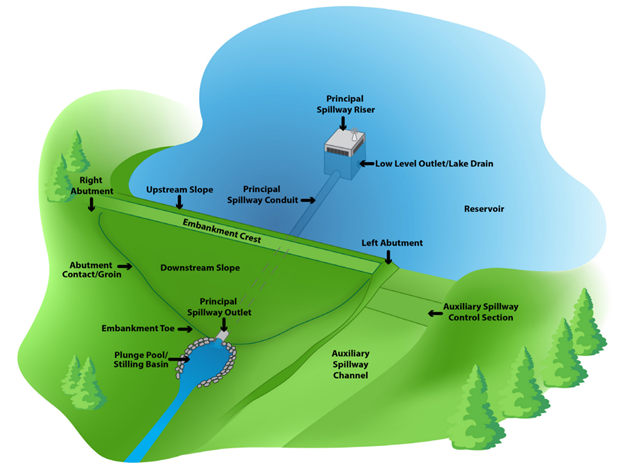Anatomy of Dams: Difference between revisions
Rmanwaring (talk | contribs) No edit summary |
Rmanwaring (talk | contribs) No edit summary |
||
| Line 13: | Line 13: | ||
</br> | </br> | ||
<noautolinks>==Best Practices Resources==</noautolinks> | <noautolinks>==Best Practices Resources==</noautolinks> | ||
{{Document Icon}} [[Pocket Safety Guide for Dams and Impoundments (FEMA P-911)| Pocket Safety Guide for Dams and Impoundments ( | {{Document Icon}} [[Pocket Safety Guide for Dams and Impoundments (FEMA P-911) | Pocket Safety Guide for Dams and Impoundments (FEMA P-911), FEMA, 2016]] | ||
==Trainings== | ==Trainings== | ||
Revision as of 21:42, 13 December 2022

Dams are complex structures that differ due to varying site conditions, intended purposes, anticipated loading conditions, and other factors. Despite the wide range of design considerations among dams of all types, there are a few functions and features that are common to most dams.
The basic features common to most dams are illustrated in the adjacent figure, and include the dam structure, means of water conveyance (spillway(s) and outlet works), and the reservoir. While the type of dam structure or spillway may vary from dam to dam, the function and general layout are similar. A more thorough discussion of these basic anatomical features of dams is provided on the following topic pages:
Best Practices Resources
![]() Pocket Safety Guide for Dams and Impoundments (FEMA P-911), FEMA, 2016
Pocket Safety Guide for Dams and Impoundments (FEMA P-911), FEMA, 2016
Trainings
![]() ASDSO Dam Owner Academy: Dams 101
ASDSO Dam Owner Academy: Dams 101
Revision ID: 5460
Revision Date: 12/13/2022
